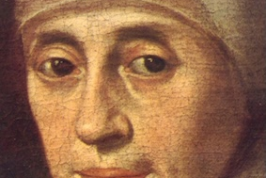Cardinal Nichols: 'St Augustine of Canterbury is a fine patron for communications'

Cardinal Vincent Nichols
Cardinal Vincent Nichols said St Augustine of Canterbury is a 'fine patron' for the work of communications. Speaking this evening at the Catholic Communications Network World Communications Day Mass and Lecture at St Patrick's in Soho, London, the Cardinal said that Augustine 'showed many of the characteristics that we too need'. These characteristics include "the importance of courage" and "of symbols to get across the very heart of the message."
The Cardinal said that the saint had a "clear strategy" to face the circumstances of his time. "He came face to face with the pagan society not in order to contradict it, but it order to offer its fulfilment. In practice this meant not seeking to empty or destroy the pagan temples, not to undermine the festivals and rhythms of life, but to convert them, to fulfil them, to bring them into the service of the one true God whose Gospel he was announcing."
The World Communications Day Mass and lecture is organised by the Catholic Communications Network (CCN) - the media office for the Catholic Church in England and Wales. Following the Mass, Lord Patten of Barnes, the President of the Vatican's Media Committee delivered a lecture outlining his committee's recommendations for the future of the Vatican's media operations.
The full homily text follows:
This is such a good day on which to celebrate our Communications Day Mass. St Augustine of Canterbury is a fine patron for our work for he showed many of the characteristics that we too need.
The words of St Paul set the scene. It is God, says Paul, who gives us the courage to proclaim his Good News, even in the face of great opposition. St Paul also pinpoints the importance of motive, as well as courage: he speaks not in order to flatter his listeners, nor as a cover for getting money, nor seeking praise or honour in their eyes. He explains his motive in a much simpler way: he wants to be like a mother feeding her children, watching carefully as they eat correctly, grow strong and then head on out into the world.
Augustine knew about the importance of courage because at times he lacked it and was filled with fear. Having set out on his missionary journey, he lost his nerve and turned back to the safety of his monastery. Pope Gregory would have none of it and sent him back on his mission, ensuring that there were allies on the road to encourage this band of brothers.
When he landed in Kent, in 597, he made his purpose clear. The monks processed ashore carrying aloft only two things: a crucifix and a bible. He knew the importance of symbols to get across the very heart of his message.
That message was the same as the message proclaimed by the first disciples, as described for us by St Luke: 'Peace be to this house!'; and this invitation, 'Know that the Kingdom of God is very near to you.'
It is important for us to remember that the kingdoms to which Augustine had been sent had lost sight of their earlier Christian heritage and way of life. Christianity was largely submerged, swamped by the pagan Saxon, or Anglo-Saxon, invaders. But Augustine, guided by Pope Gregory, had a clear strategy for these circumstances. He was going to show how his Lord and Master, carried above them on the cross and the Gospel borne aloft in front of them, were the fulfilment of all the hopes and dreams of the people he was coming to meet. He came face to face with the pagan society not in order to contradict it, but it order to offer its fulfilment. In practice this meant not seeking to empty or destroy the pagan temples, not to undermine the festivals and rhythms of life, but to convert them, to fulfil them, to bring them into the service of the one true God whose Gospel he was announcing. He knew, at the profoundest level, that this faith is not an ideology which requires the destruction of all that stands before it, even though the faith had been lost to sight. He believed, as we do, that our faith is the fulfilling of human endeavour and can indeed draw on all that is best within that striving.
What faces us today as we ponder on our mission, our missionary journeys? What of all that stands before us today is to be seen as something for us to harness rather than oppose, fulfil rather than belittle? Many things, I believe. There is so much good rising in the hearts of people today, even if they have, to a larger degree, lost sight of their Christian heritage.
But this is Communications Day. So perhaps our focus should be there. What about, for example, the digital world, the world of communications that surrounds us, shapes us and, in my case at least, confuses us! What does it tell us about ourselves and our society that is for our comfort?
I think it highlights deep longings and desires: the desire to connect and be connected; the desire to have access to knowledge and information - and speedily; the desire for guidance, to follow an attractive person or suggestion; the desire to share what I have and what I receive from others; and, finally, the desire to be entertained, amused, making life a little lighter.
Surely we understand these desires very well indeed! Surely we can see how they are addressed, at the most profound level, by the good news of Jesus Christ. He connects himself to us and connects us to each other in a new life. He is our Truth, a living Truth that we can embrace and by which we can be possessed. He is our Lord, the one above all else whom we can follow with certainty. And he is our joy, our eternal laughter, the Lord of the dance supreme!
So there is our challenge. Can we not bring to the digital world the satisfaction he brings for hungry spirits and hearts? So many of you here today understand this world well. You know what is needed to gain traction, to build a following. You know how to construct a message for the digital world, and it cannot be anything like a sermon! Perhaps you know how to translate a sermon, even this one, into something that can find its place it the spirited dynamic of this new world.
I hope so, because the prizes are great, for the Gospel!
Jesus sent out '72 others' - others in addition to the first group of apostles. This is you! The harvest is indeed rich even if the labourers are few. But it has also been so!
Amen.
Source: CCN
See also: ICN 27 May 2015 - London: Lord Patten outlines recommendations for Vatican media www.indcatholicnews.com/news.php?viewStory=27541


















